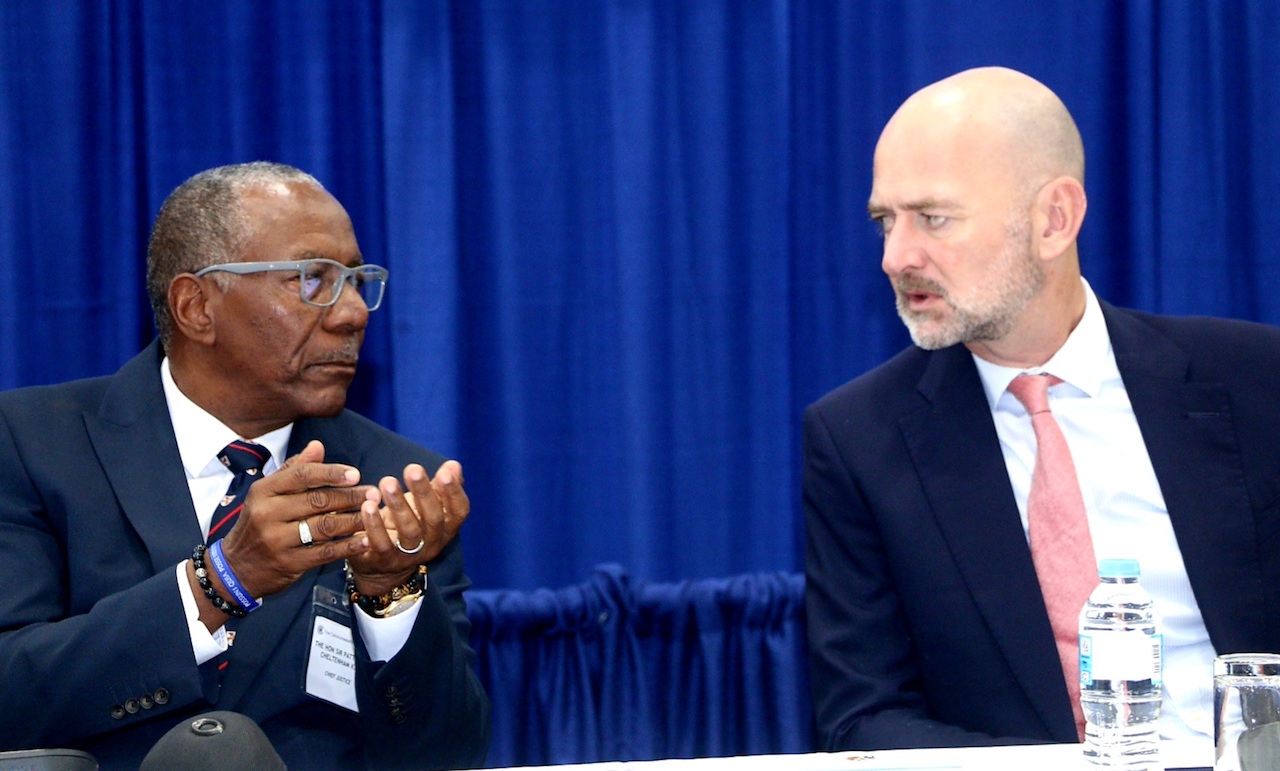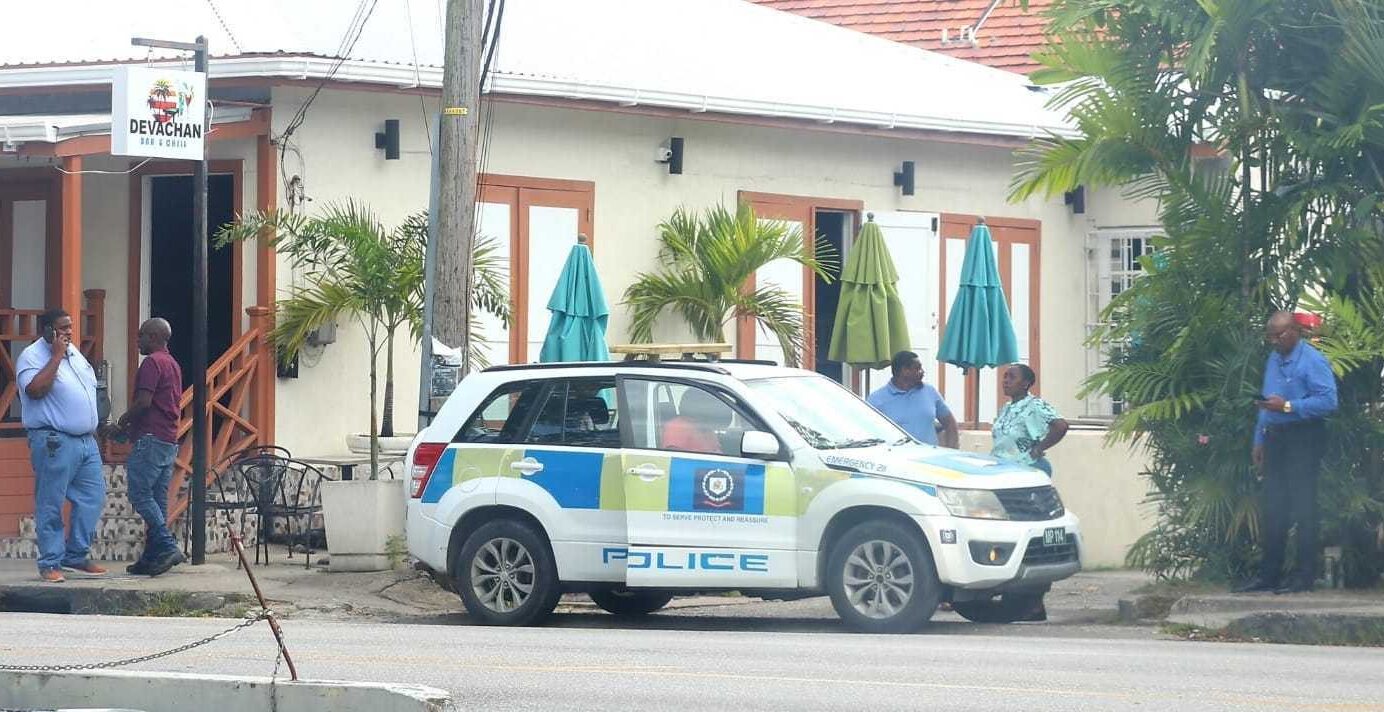Chief Justice Criticizes Outdated Legislation Impacting Judicial Independence in Symposium Speech

April 9, 2024
Outgoing Chief Justice Sir Patterson Cheltenham criticizes holdover legislation dating back to colonial rule, calling for reforms to strengthen judiciary independence. Appeals for support at Commonwealth Secretariat Symposium.
Outgoing Chief Justice Sir Patterson Cheltenham on Monday delivered a broadside against holdover legislation dating back to the end of colonial rule when the independence constitution was enacted in 1966, as he blasted “historical errors” that undermine the judiciary’s independence.
He appealed to fellow judges to lend him their support as he leads the “battle” to see the laws “cut out”.
Sir Patterson was speaking to journalists on the sidelines of the opening of the Commonwealth Secretariat Symposium on the Latimer House Principles, a three-day event at the Lloyd Erskine Sandiford Centre.
He said there were legal discrepancies that weakened the self-governance of the judicial system in which judges must apply to the executive branch of government for leave, retirement and budgetary powers. He said he hoped the symposium’s participants would take full advantage of the opportunity to voice serious concerns affecting the judicial branch.
The head of the judiciary said: “Historically, the Chief Justice, where there’s an application for leave from a member of the judiciary, sends that letter to the then governor-general, now the President for approval. I’m completely and deeply opposed to it because it makes absolutely no sense. Whoever is the Chief Justice is the head of the judiciary, and that person must know better than anyone else when the requirements should be given and when they should be modified, and the decision should stop with the Chief Justice. To go to the executive is an interference. It is a historical error that has been perpetuated, and it needs to be cut out completely,” he declared.
“There’s no person better equipped than the Chief Justice and his support staff about the granting of leave. And by support staff [I mean that] if you’re from the Criminal Division, it would be the head of the Criminal Division. If you’re from the Family Division, it would be the head of the Family Division. If you’re from the Civil Division, it would be the head of the Civil Division.”
Sir Patterson also outlined a similar situation when a lawyer wanted to apply for an extension upon reaching retirement age. Under the Constitution, a High Court judge retires at age 65 while a Chief Justice or Justice of Appeal retires at 70. Both can apply for a two-year extension.
“That should never be in anyone’s constitution because it puts you into the playbook of the executive. If you have an active case against the government at the time, it means that the judge has to be wondering if I rule to the left, maybe I will not get the extension; if I rule to the right, which I don’t think I should go, I’ll probably get the extension. No judge should have those conflicting emotions about the case, and that should also be changed. I’m hoping that in the newest version of the Constitution, those powers will be given to whoever is the Chief Justice of the day so that he/she will have a discussion with the judge who has applied,” he added.
The Chief Justice stressed that “no politician should have a say in that, because it compromises the integrity of the judicial system straight to its core and again I’m unapologetic and stringently opposed to that”.
“[However,] it’s no politician’s fault; that came with the Constitution in 1966 . . . . This is a fault line that came through and fault lines have to be corrected, and that one is an urgent need.”
Sir Patterson also complained of a lack of resources in the Office of the Chief Justice and departments that report to the office. He said on numerous occasions, he and other staff had to get documents printed at private businesses as there was no printer in the office.
This issue, he said, was because the Chief Justice does not control the judicial purse.
“It’s largely because there’s no budgetary control by the Chief Justice’s office because there’s no such entity. I’m trying to create one. The budget is controlled by the Attorney General. It’s nonsense. Why is the Attorney General controlling the Registration Department? Historically, again, that is how it has been. It cannot continue; all of this impacts on the independence of the judiciary and frustrates the judiciary. We need to have a separate vote with a chief financial officer responsible for the expenditure,” he insisted.
He told the symposium that he had set the bar with a “fearless speech” with the hope that other legal minds would follow suit, declaring that it was important to have frank and robust discussions for the country’s betterment.
“We have been biting at the edges and fearful to get into the centre . . . . We can’t go forward with people fearful about speaking . . . . I just want to have a constructive presentation of facts with some sensible inferences to be drawn and hopefully coming out of this conference, some positive, strong suggestions coming out, all for the betterment of the judiciary.”
The Commonwealth Latimer House Principles is part of the commitment of member countries to democratic principles and shared political values, including the rule of law, human rights and good, effective and equitable governance.
Commonwealth states such as Barbados pledged to adhere to these shared democratic values. One of the values is that the constitutions of each member country must reflect the core principles of the separation of the powers of the executive (President, Prime Minister and Cabinet), judicial (courts and judges), and legislative (House and Senate) branches of government.
sheriabrathwaite@barbadostoday.bb


